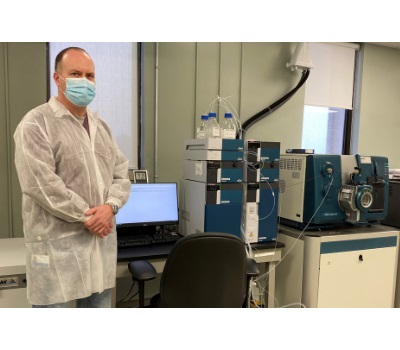Esoteric Laboratory manager Randy Veinotte creates win-win situation—an upgrade to equipment generates upsurge in revenue

Randy Veinotte in Nova Scotia Health's toxicology laboratory
By Lisa MacSween
From aging laboratory equipment to creating revenue in health care, Randy Veinotte, esoteric laboratory manager at Nova Scotia Health played a pivotal role in generating revenue to re-invest in the province’s health care system.
In his role, Veinotte oversees eight different laboratories within the Mackenzie Building located at the QEII’s Victoria General site in Halifax, including Toxicology. Toxicology includes two different streams of testing – medical/clinical (for monitoring anti-rejection drugs on transplant patients, as an example) and forensic (for urine drug screening and confirmation).
“If someone is taking anti-rejection drugs following a transplant, there are two situations that we monitor,” explained Veinotte. “One, if the drug levels are too low, their body can reject the organ. But on the other spectrum if the drug levels are too high, they can become toxic to the body and affect other organs. That’s why it’s really important for transplant patients to have their drug levels monitored.”
Veinotte noted that for some patients this testing is needed weekly or even daily.
Due to the vital role the toxicology laboratory plays in managing the health of transplant patients, an investment was made to replace the laboratory equipment starting in February of 2019.
The new equipment also provided an opportunity to repatriate forensic testing and bring back revenue to reinvest in health care.
Nova Scotia Health’s Toxicology Laboratory is the only laboratory in the province that has the type of equipment to do this testing. In other, larger provinces, private laboratories or specialty forensic laboratories handle forensic testing for court cases. In the recent past Nova Scotia had to send their samples out of province for testing resulting in longer turnaround times and higher cost for the province.
Bringing the forensic testing back to Nova Scotia Health’s laboratory has shortened the turnaround times and generated new revenue to be reinvested into health care as Nova Scotia Health gets paid per forensic sample.
On average, the toxicology laboratory processes about 350 forensic samples per month. Processing the 350 samples results in more than 13,000 individual drugs levels being reported.
“Due to the demand, we anticipate about $600K in operating revenue this fiscal year,” said Carrie Birthwright, manager, Financial Planning and Value Creation at Nova Scotia Health. She noted that this service just began in July 2021.
Birthwright was also part of the project that worked with Veinotte to set up the financial aspects of the project, including seeking approval, establishing the financial accounts and coordinating invoicing. They also continue to work together to project outcomes.
“This is an excellent example of departments listening to each other’s challenges and working together to find a solution,” said Birthwright. “I was pleased to be part of a project that wanted to create a revenue source and contribute to the sustainability of our organization.”
Veinotte echoes Birthwright, adding, “It’s a win-win situation—It's exciting that we're able to use the laboratory that we already have to generate revenue that can go back into the health care system.”




